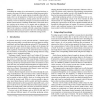Free Online Productivity Tools
i2Speak
i2Symbol
i2OCR
iTex2Img
iWeb2Print
iWeb2Shot
i2Type
iPdf2Split
iPdf2Merge
i2Bopomofo
i2Arabic
i2Style
i2Image
i2PDF
iLatex2Rtf
Sci2ools
ECAI
2004
Springer
2004
Springer
Indirect and Conditional Sensing in the Event Calculus
Controlling the sensing of an environment by an agent has been accepted as necessary for effective operation within most practical domains. Usually, however, agents operate in partially observable domains where not all parameters of interest are accessible to direct sensing. In such circumstances, sensing actions must be chosen for what they will reveal indirectly, through an axiomatized model of the domain causal structure, including ramifications. This article shows how sensing can be chosen so as to acquire and use indirectly obtained information to meet goals not otherwise possible. Classical logic Event Calculus is extended with both a knowledge formalism and causal ramifications, and is used to show how inferring unknown information about a domain leads to conditional sensing actions.
| Added | 01 Jul 2010 |
| Updated | 01 Jul 2010 |
| Type | Conference |
| Year | 2004 |
| Where | ECAI |
| Authors | Jeremy Forth, Murray Shanahan |
Comments (0)

